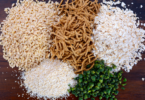Ginkgo Biloba, also known as the maidenhair tree, has various uses (e.g. for its memory-enhancing powers) in traditional medicine and as a source of food. Traditional Chinese medicine has used the ginkgo leaves (Pic. 1) for circulatory disorders, brain disorders, respiratory diseases such as asthma, urinary tract disorders, and as an antiparasitic. More recently ginkgo has become very popular and is commonly used as a memory enhancer (nootropic) by healthy patients.
Ginkgo Biloba as Aphrodisiac?
Animal Studies
Ginkgo biloba aqueous extract was administered orally with different doses (25, 50 and 100 mg/kg/day) to mice for 90 days [1]. The treatment caused significant changes in the weight of sexual organs (caudae epididymis, prostate), chromosomal aberrations and rate of pregnancy. Percent motility, sperm count and morphology of spermatozoa were unaffected. Fourteen day treatment with Ginkgo biloba leaves extract (50 mg/kg of body weight per day) has also been reported to enhance copulations in male rats by Yeh et al. [2]. Same researchers further investigated Ginkgo biloba leaves extract on noncontact erection in male rats [3]. Treatment with extract significantly increased the number of noncontact erections but decreased latency of erection. Researchers also noted significantly increased levels of dopamine in the bed nucleus of the stria terminalis and medial preoptic area. Findings of both studies suggested that increased noncontact erections and enhanced copulatory behavior may be related to dopaminergic activity, which regulates prolactin secretion [2,3].
Human Studies
After intravenous administration of Ginkgo biloba extract, derived from the leaves of the Ginkgo tree, to 50 men (aged <70 yrs) with erectile impotence only 11 remained impotent [4]. In an open trial Ginkgo biloba was found to be 84% effective in treating antidepressant-induced sexual dysfunction (mostly caused by selective serotonin reuptake inhibitors) [5]. However, a follow-up randomized, double-blind, placebo-controlled study found no statistically significant difference from the placebo at weeks 2, 4 and 8 after Ginkgo biloba supplementation [6]. Both groups (Ginkgo biloba and placebo) showed improvement in some part of the sexual function, which is suggestive of the importance of the placebo effect in assessing sexual function [6]. A triple-blind, randomized, placebo-controlled, trial of Ginkgo biloba 240 mg daily also failed to reach significance in treating sexual dysfunction due to antidepressant drugs [7]. However there were some spectacular individual responses in both groups.
Pic. 1 – Ginkgo biloba leaves.
Effects of Ginkgo Biloba on Memory and Learning
There is some promising preliminary evidence favoring the use of ginkgo for memory enhancement in healthy subjects, however, not definitive.
Ginkgo biloba is claimed to enhance mental focus and improve memory and concentration. Several published studies reported beneficial effects of ginkgo on cognition. However, these claims are generally not supported by well-controlled clinical studies. Paul R. Solomon and associates [8] evaluate ginkgo in healthy elderly volunteers in a randomized, double-blind, placebo-controlled trial and reported no measurable benefit in memory or related cognitive function after 6 week supplementation. Clinical trial by Subhan et al. [9] also failed to find statistically significant changes in critical flicker fusion, choice reaction time or subjective ratings of drug effects. However, at 600 mg of Ginkgo biloba extract memory (assessed using the Sternberg technique) was found to be significantly improved.
Well-controlled study by Sarah Elsabagh and colleagues [10] reported that 6 week treatment with 120 mg/day of ginkgo significantly improved performance on the sustained-attention task and pattern recognition memory task in young volunteers. Working memory, planning, mental flexibility and mood remained unaffected. Statistical analysis by Stough et al. [11] reported significant improvements in speed of information processing working memory and executive processing with Ginkgo biloba extract supplementation to healthy population. Beneficial effects of ginkgo seem to be dose dependent (though not in a linear dose related manner). 120 mg dose of ginkgo seems to produces the most evident effects [10,12]. Ginkgo’s effect on cognition was also confirmed by Rigney and assistants [12], particularly working memory. In 24 normal adults (12 male, 12 female) nutrient supplement containing 40 mg Ginkgo biloba speeded up short-term memory processing, however nutrient compound also contained 10 mg of Vinpocetine which is a known nootropic [22].
Many studies reporting beneficial effect of Ginkgo biloba extract on one or more aspects of cognitive function are often either not replicated, or are directly contradicted by other studies. This was also concluded by systematic review of randomized clinical trials testing the nootropic effects of Ginkgo biloba extracts (trials up to January 2007) [13]. Review also reported that there is no robust or convincing evidence (either acute or longer term) for Ginkgo ingestion for any aspect of cognitive function in healthy young subjects [13]. However, studies provide some consistent evidence that chronic administration improves selective attention, some executive processes in subjects with mild cognitive impairment, depression, and multiple sclerosis [14].
Treatment of Alzheimer’s Disease and Dementia
Large-scale, long-term and well-designed study using 120 mg of Ginkgo biloba twice daily has failed in reducing either the overall incidence rate of dementia or Alzheimer’s disease incidence in 1545 elderly individuals with normal cognition and those with mild cognitive impairment over the course of 6,1 years [20]. This study provided a robust result of a lacking effect of Ginkgo biloba in dementia prevention and overall mortality in people without dementia. A later systematic review and meta-analysis [21] which included 2372 patients in total reported that ginkgo may be more effective than placebo for treatment of Alzheimer’s disease as well as vascular and mixed dementia. However, study by DeKosky et al. [20] was not included in this review.
Other Uses
A 70% ethanolic extract of the Ginkgo biloba leaves is suggested to promote hair regrowth when fed orally to mice and could be used as a hair tonic [15]. Ginkgo biloba may also reduce blood pressure elevation and inhibits the rise in salivary cortisol after exposure to stress stimuli [16]. Ginkgo can also be found in some anti-wrinkle cosmetics and is reported to increased skin moisturization (27.88%) and smoothness (4.32%) and reduced roughness (0.4%) and wrinkles (4.63%) [17].
Ginkgo Biloba Side Effects and Toxicity
The herb is generally considered safe and is well tolerated. However due to multiple case reports of bleeding, it should be used cautiously in patients with known blood clotting disorders or on those on anticoagulant therapy [18]. Ginkgo should also be used with caution during pregnancy, particularly around labour where its anti-platelet properties could prolong bleeding time [19]. Some common side effects may include gastrointestinal disturbances, headache, and general central nervous system activation [5].
Abdulaziz et al. [1] warranted careful use of Ginkgo biloba as a supplement for impotence and/or erectile dysfunction due to observed toxicity in animal models.
(Other common names: Ginkgo Extract, Ginkgo Folium, Ginkgo Leaf Extact, Ginkgo Seed, Japanese Silver Apricot, Kew Tree, Ginkgolic Acid)
[the_ad id=”28979″]
References
-
Al-Yahya, Abdulaziz A., et al. “Studies on the reproductive, cytological and biochemical toxicity of Ginkgo Biloba in Swiss albino mice.” Journal of ethnopharmacology 107.2 (2006): 222-228.
-
Yeh, Kuei-Ying, et al. “GB extract enhances male copulatory behavior and reduces serum prolactin levels in rats.” Hormones and behavior 53.1 (2008): 225-231.
-
Yeh, Kuei-Ying, et al. “GB extract treatment increases noncontact erections and central dopamine levels in rats: role of the bed nucleus of the stria terminalis and the medial preoptic area.” Psychopharmacology 210.4 (2010): 585-590.
-
Sohn, Michael, and Richard Sikora. “Ginkgo biloba extract in the therapy of erectile dysfunction.” Journal of Sex Education & Therapy; Journal of Sex Education & Therapy (1991).
- Cohen, Alan J., and Barbara Bartlik. “Ginkgo biloba for antidepressant-induced sexual dysfunction.” Journal of sex & marital therapy 24.2 (1998): 139-143.
-
Kang, Byung‐Jo, et al. “A placebo‐controlled, double‐blind trial of Ginkgo biloba for antidepressant‐induced sexual dysfunction.” Human Psychopharmacology: Clinical and Experimental 17.6 (2002): 279-284.
-
Wheatley, David. “Triple‐blind, placebo‐controlled trial of Ginkgo biloba in sexual dysfunction due to antidepressant drugs.” Human Psychopharmacology: Clinical and Experimental 19.8 (2004): 545-548.
-
Solomon, Paul R., et al. “Ginkgo for memory enhancement.” JAMA: the journal of the American Medical Association 288.7 (2002): 835-840.
-
Subhan, Z., and I. Hindmarch. “The psychopharmacological effects of Ginkgo biloba extract in normal healthy volunteers.” International journal of clinical pharmacology research 4.2 (1983): 89-93.
-
Elsabagh, Sarah, et al. “Differential cognitive effects of Ginkgo biloba after acute and chronic treatment in healthy young volunteers.” Psychopharmacology 179.2 (2005): 437-446.
-
Stough, Con, et al. “Neuropsychological changes after 30-day Ginkgo biloba administration in healthy participants.” The International Journal of Neuropsychopharmacology 4.2 (2001): 131-134.
-
Rigney, U., S. Kimber, and I. Hindmarch. “The effects of acute doses of standardized Ginkgo biloba extract on memory and psychomotor performance in volunteers.” Phytotherapy Research 13.5 (1999): 408-415.
-
Canter, Peter H., and Edward Ernst. “Ginkgo biloba is not a smart drug: an updated systematic review of randomised clinical trials testing the nootropic effects of G. biloba extracts in healthy people.” Human Psychopharmacology: Clinical and Experimental 22.5 (2007): 265-278.
-
Kaschel, Reiner. “GB: specificity of neuropsychological improvement—a selective review in search of differential effects.” Human Psychopharmacology: Clinical and Experimental 24.5 (2009): 345-370.
-
Kobayashi, N., et al. “Effect of leaves of Ginkgo biloba on hair regrowth in C3H strain mice].” Yakugaku zasshi: Journal of the Pharmaceutical Society of Japan 113.10 (1993): 718.
- Jezova, D., et al. “, Reduction of rise in blood pressure and cortisol release during stress by Ginko biloba extract (EGb 761) in healthy volunteers.” Journal of physiology and pharmacology 53.3 (2002): 337-348.
- Chuarienthong, P., N. Lourith, and P. Leelapornpisid. “Clinical efficacy comparison of anti‐wrinkle cosmetics containing herbal flavonoids.” International journal of cosmetic science 32.2 (2010): 99-106.
- Diamond, Bruce J., et al. “Ginkgo biloba extract: Mechanisms and clinical indications.” Archives of physical medicine and rehabilitation 81.5 (2000): 668-678.
- Dugoua, Jean-Jacques, et al. “Safety and efficacy of ginkgo (Ginkgo biloba) during pregnancy and lactation.” Can J Clin Pharmacol 13.3 (2006): e277-84.
-
DeKosky, Steven T., et al. “GB for prevention of dementia: a randomized controlled trial.” Jama 300.19 (2008): 2253-2262.
-
Weinmann, Stefan, et al. “Effects of GB in dementia: systematic review and meta-analysis.” BMC geriatrics 10.1 (2010): 14.
- Polich, John, and Rebecca Gloria. “Cognitive effects of a Ginkgo biloba and vinpocetine compound in normal adults: systematic assessment of perception, attention and memory.” Human Psychopharmacology: Clinical and Experimental 16.5 (2001): 409-416.




